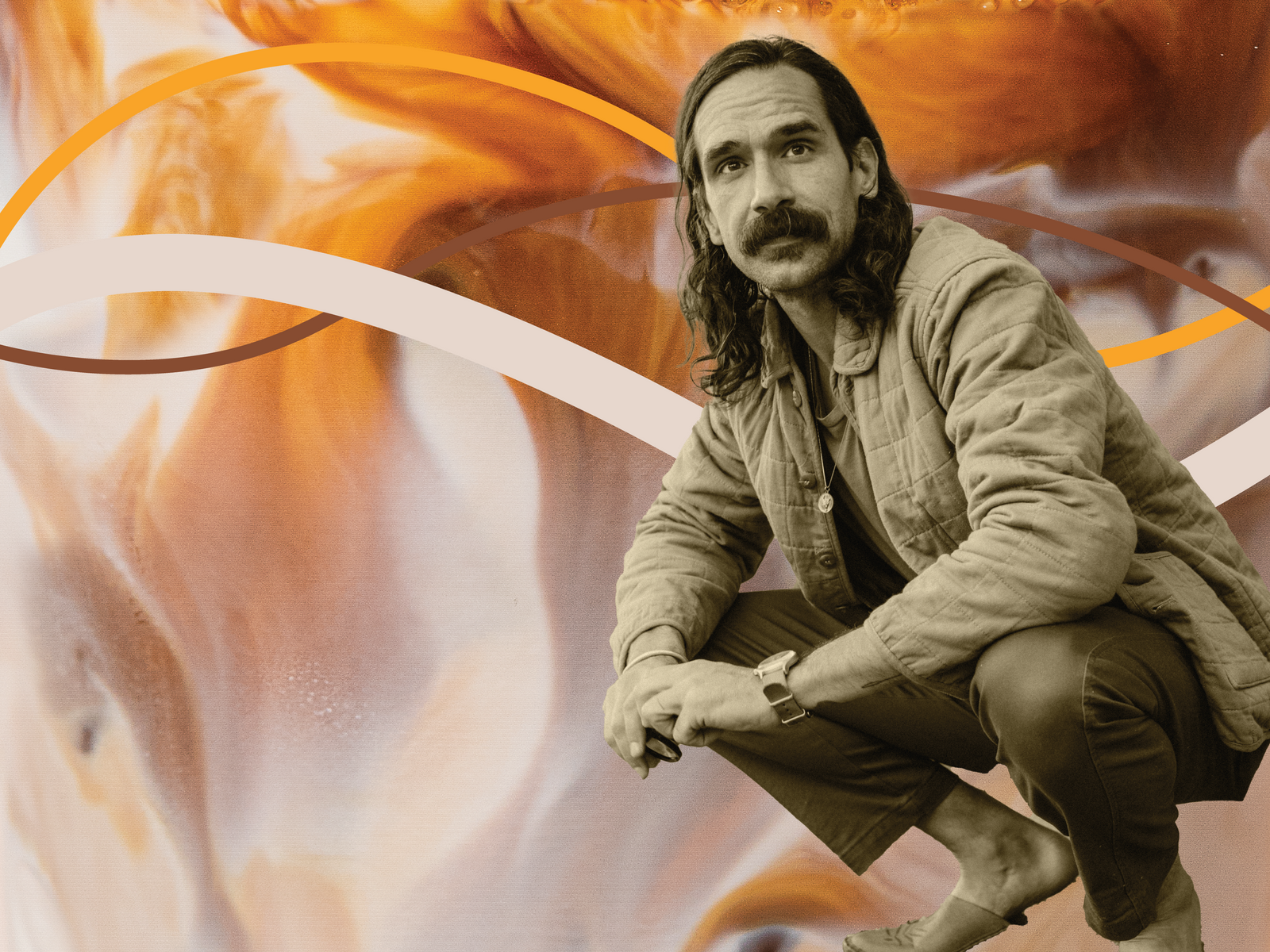In our Inspiration Fuel series, we interview writers, artists, musicians, entrepreneurs, and everyday heroes about how they manage the ebbs and flows of motivation and creativity in the pursuit of their life’s callings.
TV writer Andrew Secunda has been dead center of the best new comedy for decades.
He was a teacher and improviser at New York’s legendary Upright Citizens Brigade Theatre from its inception, where he was part of some of the most iconic improv groups of all time: ASSSSCAT, The Swarm, and The Stepfathers.
He has written for Late Night With Conan O’Brien, Saturday Night Live, and The Goldbergs. He acted in Flight of the Conchords, The Other Guys, Arrested Development, Curb Your Enthusiasm, and The League. And, currently, he co-hosts the podcast Star Trek: The Next Conversation and is knee deep in developing numerous writing and acting projects.
In this interview, we asked Andy to reflect on what got him into comedy, the differences between inspiration and pure hard work, and how he regains motivation when all else fails.
*****
You’re multi-talented: writer, director, actor, improviser, teacher, podcaster... How would you introduce yourself and your work generally?
I usually wouldn’t, but that’s my own issue. If pressed, I’d say I was a TV writer because people are usually asking how I make my money, and that’s mostly how I have.
What are some favorite projects that you’ve worked on?
On “Late Night with Conan” I got to meet Jackie Chan and write Star Wars jokes for Harrison Ford, as well as write jokes for Triumph the Insult Comic Dog on the Star Wars ticket line. When I got to write and direct my own pieces it was the most fun.
Watch: Andy’s favorite joke, in which Triumph the Insult Comic Dog roasts Darth Vader.
How did you first get into comedy? Was there a specific moment when you realized that it might be a calling for you?
I originally wanted to be a film director (and still do), but I had a facility for and loved comedy as far back as I can remember. I listened to comedy records and loved Monty Python and Saturday Night Live and Bill Murray and Eddie Murphy, and I’d make little comic animated films and record comedic radio shows with friends on a cassette (we also lit our homes by gas lantern back then).
As an adult I got into improv mostly to get comfortable onstage but I was so obsessed with it, it became the center of my life. It led to me acting in small parts on “Late Night with Conan” which eventually led to a staff writing job there.
Watch: Andy’s Godfather sketch with Robert Duvall and Abe Vigoda, for Late Night With Conan
For most of us, creativity is what helps us recover and revive; it’s the “play” that balances “work.” But when you have a creative career, how do you separate the two? How do you “play”?
Play in my career has to sneak up on me. It’s easier when I’m in a writers room. Even though it can be insanely long hours and extremely laborious mentally, when you’re in a room with 5–10-ish other incredibly funny people, there’s a lot of bouncing off each other and making each other laugh, sometimes off-work goals, sometimes on, so that often feels playful.
It’s definitely a struggle to separate the “play” that leads to good creativity from hard tasks that you have to/want to complete.
I’m terrible at navigating that distinction on my own, but pretty good at it when I’m running (aka leading) a room of writers (it’s true, please don’t fact check that with anyone I’ve worked with).
Some artists describe their best moments of creativity as flow states, while others say even a good session feels like work, and still others describe it as something even harder than work, more like self-torture. For you, what counts as a “good” creative session and what does it feel like?
The moments of true flow have been rare for me, and I’d count them as moments when I truly disappear into the writing/characters/world.
There are also moments of flow inspiration, when an idea comes fully formed into my head and I just know it’s right (it may not work, but I know it’s right anyway!).
I’ve felt these flow moments both in conceiving ideas, writing them, and onstage as an improviser. Improv is usually fun and ends up in varying percentages of flow state, which is easier to enter in improv because you’re building the moments throwing energy back and forth on stage with insanely creative and funny people.
Writing is more of a rough game because you have to push the boulder up the hill all by your lonesome.
It’s not particularly functional to wait for inspiration as a motivator, so you have to look to other motivators to get yourself to produce work.
Sometimes I’ll start a writing session trudging through self-hate and emotional mud, but then hit something, a spin on a moment in a script, which kicks me into a flow state.
Generally speaking though, I’ve gotta work to get there and it’s very hard to tell whether anything I’m writing is good (as there’s no audience there to laugh and tell me it is), so it doesn’t feel “flow”-y, it does, usually, feel torturous.
The writer Anne Lamott has said that “inspiration” has never been a factor in her process, that, for her, the only effective motivations are debt, fear of failure, mental illness, and the desire for revenge. But comedy strikes me as something that absolutely requires flashes of brilliance. So, do you believe in inspiration? What role does it play in your process?
I do believe in inspiration, and I’m pretty sure Anne Lamott does too, but it’s not particularly functional to wait for inspiration as a motivator, so you have to look to other motivators like the above to get yourself to produce work.
I think this is because inspiration, at least for me, might not even feel like inspiration – it may feel terrible, but the end result might be good.
I think following (non-destructive) impulses tends to wake up that part of your brain and it slowly learns to trust you, and you can start to build momentum and more moments of inspiration.
So in lieu of that “I’m on fire!” feeling, you have to just keep moving forward – or rather – a healthy, prolific writer would have to keep moving forward.
Can passion/motivation/inspiration (or whatever you call the drive to be creatively productive) be manufactured? If so, how do you do it? And, if not, where do you think it comes from?
This has been the single greatest question of my adult life, and I don’t know that I have a satisfying answer to it, but I’d say minimally you have to decide to stay open to passion and inspiration, and try to nurture them by incrementally following creative impulses, even down to small things like taking a walk when it strikes you, or drawing a doodle, or watching a show or movie or reading a book just because it popped in your head.
I think following (non-destructive) impulses tends to wake up that part of your brain and it slowly learns to trust you, and you can start to build momentum and more moments of inspiration.
I think, like the magical state of flow, passion and inspiration come from a pure, true voice in your heart/head/soul that wants to express itself, and when you’re unfettered and confident, it’s almost drug-like in the way it satisfies you when you follow it.
But passion and inspiration don’t necessarily equate to consistent hard work or creative drive, unfortunately. I’ve definitely been in a production process where I’ve become obsessed [to a point where] time and any sense of effort dissolved away in pursuit of a vision. It’s hard to say what creates this drive, other than a combination of clarity of vision, confidence, and an ability (often faltering) to step out of your own way.
There are lots of us who struggle to maintain enthusiasm for the work or projects that we love, even if we feel a calling to pursue them. What advice would you give for dealing with dark days when there’s just no motivation to be found?
This is one of the top roughest creative challenges there are, as it’s the most common and recurring. Sometimes it’s useful to look at the possible next steps you might take on your current project and break that step down into an even smaller step.
If it’s still tough, find an even smaller next step. If it’s a book, aim to write the next paragraph. If it’s a song, think about the next lyric.
If every step feels like too much, try simply sitting where you do your work and don’t distract yourself with your phone or anything else – sit in the discomfort for a bit. And then take a break! Take that walk! Get a coffee.
And, finally, how do you take your coffee?
Usually black. I like a lighter blend. But when I’m going for it, I’ll have variations of sweet iced lattes, optimally something crazy like white chocolate.
*****
For more of Andy's timeless wisdom, check out Star Trek: The Next Conversation:
We’re always on the lookout for more artists, creatives, entrepreneurs, and everyday heroes to interview for our Inspiration Fuel series. If someone you know is pursuing their life’s calling in a way that inspires you, tell us about them by emailing: adam@jot.co.









